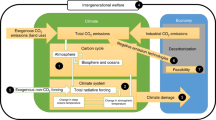Abstract
This essay sketches out what a utilitarian should support when considering global warming along with what measures can be recommended to political leaders for utilitarian reasons. If we estimate the utility of the great advantages that any ambitious climate policy might create in the name of poverty reduction in the present, I will show how a decision can be made in favor of a vigorous climate policy based on such estimates. My argument is independent of the truth of the claims of climate sceptics. Until now, the debate has neglected the double effects of a vigorous climate policy that not only avoids risks of damages but also creates utility. In conclusion, three strategies of a climate policy legitimized by utilitarianism will be introduced: (1) Utilitarianism favors global emissions trading in comparison with a global CO2 tax. (2) Utilitarianism calls for this trade to be introduced while, at the same time, investments in renewable energies should be increased. (3) Furthermore, utilitarianism favors a policy that aims to slow down the rate of population growth.
Similar content being viewed by others
Notes
Individual activities are also important but I will not regard them to focus my topic.
Meyer and Roser (2007).
Solomon et al. (2007).
Pachauri and Reisinger (2007, 76).
Cox et al. (2000).
Friedlingstein et al. (2006, 3337).
Dakos et al. (2008, 14308).
Lynas (2008, 250).
Hansen et al. (2007, 2306).
That seems to be very difficult of course, but we will see in the next section that there is an easy move to manage this roughly.
Also cf. Garvey (2008, Ch. 3).
Parfit (1987, 357).
That does not mean that population growth must take place, rather only that the size of the population remains at several billion individuals.
Ng calls for a probability of less than 0.01%. Ng (2011, 113).
Muller and MacDonald (2000).
Tol (2009, 37).
International Risk Governance Council (2009).
Tol (2009, 37).
This is implied by J. Hansen et al., as the authors write: “According to our estimates, we must be close to such a point (a tipping point that could even lead to a worst case scenario B.G.).” (Hansen et al. 2007, 2306).Their assumptions primarily focus on the question whether this point has already been reached or if it will be reached soon. This second scenario is abandoned, however, but it gives information on how close we are to this expected point. Hansen et al. base their argument on comparisons with earlier periods of the earth. The proposition that feedback mechanisms with over 50% probability will occur if we continue our BAU is a much weaker proposition than the one just cited.
Cf. Tol (2009).
Ng proposes an interesting route: “Catastrophe reduction has a huge effect on expected utility because it increases the survival probabilities (…) indefinitely into the future” (Ng 2011, 122). I do not wish to expand too much on this route, however it does at least depend on the probability of occurrence of catastrophes which eliminate the entire human race and on the utility effects in the long term. My idea should show a utility independent of precarious problems due to the probability of occurrence and one that would be created in the near future if not in the present.
Singer (1993).
Evidence for this tendency: emissions trading transfers money, and causes transaction costs while increasing the amount of happiness due to a diminishing marginal utility. Renewable energies prove to be expensive; however they soon become a means of saving, cf. data in the last paragraph.
Clark et al. 2008.
Cf. Gesang 2003, 22–26.
By noteworthy I mean any measure that leads to a prevention of CO2, which is causally influential on a global scale.
Meinshausen et al. (2009).
One could also use a comparative expression such as “the more, the better” to describe these two obligations. Where it is stated below that measure x corresponds to UD (2) or (3), what is meant is often a comparative in the sense of “better than alternative measure a-n.”
Of course one has to clarify the modalities so that the money really helps the poor and not corrupt regimes. But that is a practical question and there are ideas how they can be solved: Müller (2009).
Cf. Ekardt et al. (2010, 80f).
Cf. Müller (2009).
If these ideas are true, one must modify the principle of diminishing marginal utility, for we would of course still be maximizing utility by distributing goods and commodities from the rich to the poor, but it would not be the poorest but rather those who have access to these basic goods who would generate the greatest utility from goods. There is, however, a lack of empirical findings for these hypotheses.
By this I mean real and feasible alternatives, not invented constructions in other possible worlds.
References
Attfield, R. (2003). Environmental ethics. Cambridge: Cambridge University Press.
Clark, A. E., Frijters, P., et al. (2008). Relative income, happiness and utility: An explanation for the easterlin paradox and other puzzles. Journal of Economic Literature, 46(1), 95–144.
Connor, S. (2008). Exclusive: The methane time bomb. Blog article. The Independent. http://www.independent.co.uk/environment/climate-change/exclusive-the-methane-time-bomb-938932.html. Accessed December 29, 2011.
Cox, P. M., Bettset, R. A., et al. (2000). Acceleration of global warming due to carbon-cycle feedbacks in a coupled climate model. Nature, 408, 184–187.
Dakos, V., Scheffer, M., et al. (2008). Slowing down as an early warning signal for abrupt climate change. PNAS, 105(38), 14308–14312.
Ekardt, F., Heitmann, C., et al. (2010). Soziale Gerechtigkeit in der Klimapolitik. Hans Böckler Stiftung, (249 ed.), Düsseldorf.
Friedlingstein, P., Cox, P., et al. (2006). Climate—carbon cycle feedback analysis: Results from the C4MIP model intercomparison. Journal of Climate, 19(14), 3337–3353.
Gardiner, S. M. (2004). Ethics and global climate change. Ethics, 114(3), 555–600.
Garvey, J. (2008). The ethics of climate change, right and wrong in a warming world. London: Continuum.
German Aerospace Center (DLR) (2006). Trans—Mediterranean interconnection for concentrating solar power. Study report http://www.dlr.de/tt/Portaldata/41/Resources/dokumente/institut/system/projects/TRANS-CSP_Full_Report_Final.pdf. Accessed November 20, 2010.
Gesang, B. (2003). Eine Verteidigung des Utilitarismus. Stuttgart: Reclam.
Gesang, B. (2005). Utilitarianism with a human face. The Journal of Value Inquiry, 39, 169–181.
Gesang, B. (2011). Klimaethik. Berlin: Suhrkamp.
Hansen, J. (2009). Storms of my grandchildren. New York: Bloomsbury.
Hansen, J., et al. (2007). Dangerous human-made interference with climate: A giss modelE study. Atmospheric Chemistry and Physics, 7(11), 2287–2313.
International Risk Governance Council (2009). Geoengineering. http://www.irgc.org/geoengineering. Accessed October 10, 2009.
Lynas, M. (2008). Six degrees: Our future on a hotter planet. London: Harpercollins.
Meinshausen, M., Meinshausen, N., et al. (2009). Greenhouse-gas emission targets for limiting global warming to 2°C. Nature, 458(7242), 1158–1162.
Meyer, L. H., & Roser, D. (2007). Intergenerationelle Gerechtigkeit—Die Bedeutung von zukünftigen Klimaschäden für die heutige Klimapolitik. Bern: Bundesamt für Umwelt BAFU.
Müller, O. (2009). Mikro-Zertifikate. Für Gerechtigkeit unter Luftverschmutzern. Archiv für Rechts- und Sozialphilosophie, 95(2), 167–198.
Muller, R. A., & MacDonald, G. J. (2000). Ice Ages and Astronomical Causes. Berlin: Springer.
Ng, Y. (1989). What should we do about future generations? Economics and Philosophy, 5(2), 235–253.
Ng, Y. (2005). Intergenerational impartiality: Replacing discounting by probability weighting. Journal of Agricultural and Environmental Ethics, 18(3), 237–257.
Ng, Y. (2011). Consumption tradeoff vs. catastrophes avoidance: Implications of some recent results in happiness studies on the economics of climate change. Climatic Change, 105(1), 109–127.
Norcross, A. (1997). Comparing harms: Headaches and human lives. Philosophy & Public Affairs, 26(2), 135–167.
Norcross, A. (1998). Great harms from small benefits grow: How death can be outweighed by headaches. Analysis, 58(2), 152–158.
Pachauri, R. K., & Reisinger, A. (Eds.). (2007). Contribution of working groups I, II and III to the fourth assessment report of the intergovernmental panel on climate change. Genf: IPCC.
Page, E. (2006). Climate change, justice and future generations. Cheltenham: Elgar.
Parfit, D. (1987). Reasons and persons. Oxford: Oxford University Press.
Singer, P. (1993). Practical ethics. Cambridge: Cambridge University Press.
Singer, P. (2002). One world. New Haven: Yale University Press.
Singer, P. (2006). Ethics and climate change: A commentary on MacCracken, Toman and Gardiner. Environmental Values, 15(3), 415–422.
Solomon, S., Qin, D., et al. (Eds.). (2007). Climate change 2007: The physical science basis. Contribution of working group I to the fourth assessment report of the intergovernmental panel on climate change. Cambridge: Cambridge University Press.
Stern, N. (2009). The global deal: Climate change and the creation of a new era of progress and prosperity. New York: Public Affairs.
Tol, R. S. (2009). The economic effects of climate change. Journal of Economic Perspectives, 23(2), 29–51.
Weimann, J. (2009). Die Klimapolitik Katastrophe. Marburg: Metropolis.
Acknowledgments
I would like to thank the anonymous reviewers of an earlier version of this paper for their helpful comments! Further I want to thank Bryan Scheler for his comments.
Author information
Authors and Affiliations
Corresponding author
Rights and permissions
About this article
Cite this article
Gesang, B. What Climate Policy Can a Utilitarian Justify?. J Agric Environ Ethics 26, 377–392 (2013). https://doi.org/10.1007/s10806-012-9380-4
Accepted:
Published:
Issue Date:
DOI: https://doi.org/10.1007/s10806-012-9380-4




